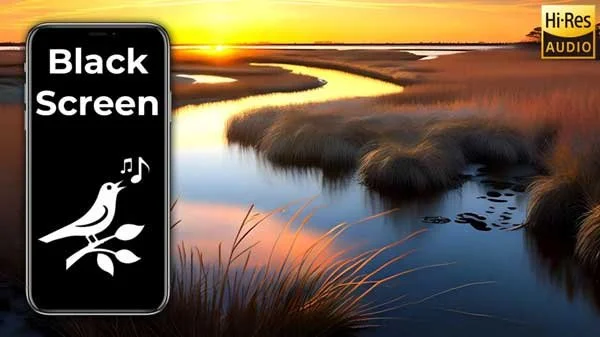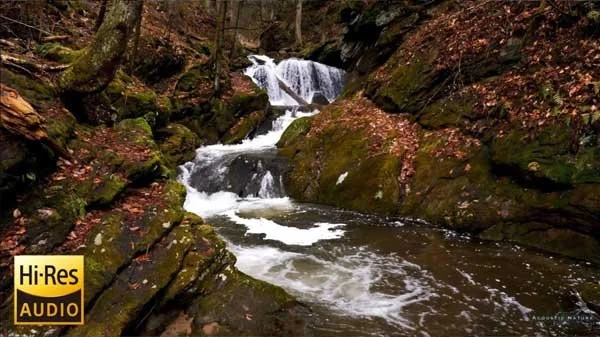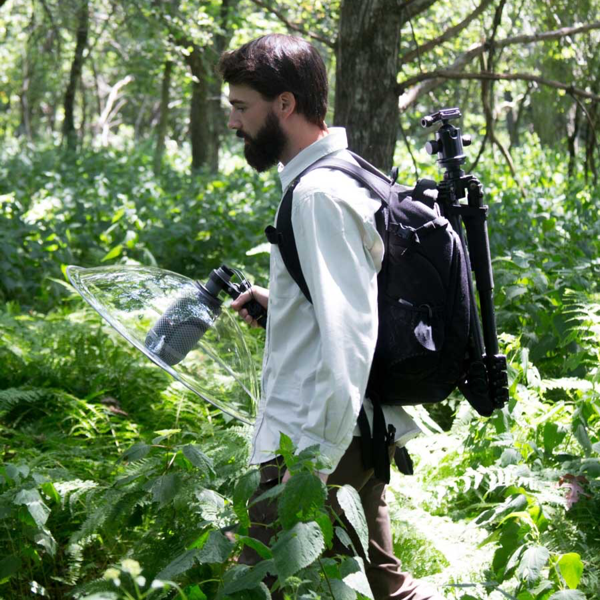Nature Sounds for Depression and Anxiety Relief
A pair of my microphones recording the dawn chorus in the Linville Gorge Wilderness, NC, USA.
Below you'll find my latest pure nature sounds.
Each recording was captured deep in remote wilderness regions, far removed from society.
In these places, the chaotic, stress-inducing sounds of humanity do not penetrate.
Instead, the sonic wonders of the natural world are on full display;
offering their healing powers to those in need.
- Enjoy ♫
Never miss an update, Subscribe on YouTube
New videos every week!
Other Nature Sound Playlists
About My Sounds
All of my sounds are recorded by myself in deeply remote natural areas to avoid any forms of noise pollution such as cars, people, jets, and airplanes.
The work is difficult but incredibly rewarding when true natural silence is discovered.
Due to the quiet and subtle nature of pure nature sounds, most microphones are not capable of recording them without adding electronic noise to the recording, which sounds like hissing, white noise in the background.
To solve this problem, I use the quietest microphones in the world; a stereo pair of Lewitt 540 SubZeros with a noise floor of only 4 dB.
To add realism and a 3D element to my recordings, I installed the SubZeros in a binaural rig that simulates a human head and ears (see image below).
Close your eyes while listening and you’ll feel like you’re really there!
A Call To Action
In a world more connected than ever before, why do we feel so alone?
In a world filled with convenience and time-saving technologies, why do we feel so stressed out?
In a world where material possessions fill up our spaces, why do we feel so empty?
Clearly, something is missing.
I believe that thing is nature.
Most people are living lives where the most time they spend outdoors is walking to their car before driving to work.
This lack of, and disconnect from nature has pushed us to the brink of insanity.
We've been blinded and led to believe that instead of stopping to smell the roses, we rush by, hoping to find peace and happiness in a new business venture, a new car, a new house...
Although we may experience small moments of happiness after achieving one of these goals, the feelings of stress, unhappiness, and loneliness set in again and we begin to think "if only I had..."
Stop these fruitless acts of happiness-seeking, and break free from this self-destructive cycle.
True peace and happiness are found in the present moment and there is no better way of arriving there than through nature.
Nature forces us to be present in the most fulfilling way. It engages all of our senses and opens them to the sheer beauty and endless details of the natural world.
Nature's sounds, sights, smells, tastes, and textures are all ripe with potential happiness, satisfaction, bliss, awe, and inspiration.
Nature fills our minds, beings, and souls in a way that modern life cannot.
It is my great hope that these videos help you find a piece of this connection, and inspire you to connect with nature in your everyday life ♥
Much love,
Jared
The Healing Powers of Nature Sounds
For hundreds of years, we’ve known that nature is a treasure trove of healing medicines; whether it be medicinal compounds found in plants, boosted vitamin D levels from sunlight exposure, or faster healing when just looking at nature.
However, the healing powers of nature’s sounds are only just becoming fully realized.
Recent studies have shown that listening to pure nature sounds can help decrease stress and anxiety; symptoms of modern life that have become all too common.
So why are we so stressed out and anxious?
While some pin it on the “need it done yesterday” mentality and the ferocious work pace expected by most employers, I believe our societal soundscapes are more to blame.
As of 2021, every day in the United States is filled with the noise of 39,000 domestic airline flights, 3.7 million construction sites, and 170 million vehicles.
We’ve reached the point where living a quiet life is almost impossible.
Noise pervades every aspect of our lives, whether it’s construction outside our door, our daily commute to work, our workplaces themselves, or jets and airplanes flying overhead while we sleep.
Wherever we go, noise seems to follow.
Recent studies have shown that exposure to our noisy societal soundscapes can cause:
sleep disturbance
increased heart rate
increased cortisol (stress) levels
increased anxiety
feelings of depression
hypertension
hearing loss
What is really eye-opening about these studies is that it doesn’t take a very loud noise or long exposure to experience these negative effects.
A 2019 study found that aircraft flying over homes at night at just 50 decibels, caused a substantial increase in participant heart rates, blood pressure, and hormone levels linked to stress.
To put this into perspective, 50 dB is equivalent to a quiet conversation, a quiet suburb, a quiet office, or a quiet refrigerator.
Most of us are subjected to sounds much louder than this during our daily lives, and if you live close to an airport, you may never get a break.
In contrast to our loud modern environments, the average natural ambience is around 30 dB, equivalent to a quiet library, rustling leaves, and whispering at a distance of 5 feet (1.5 meters).
It is in these quiet places that nature’s finest sonic tonics exist.
Studies have shown that listening to pure nature sounds for only 4 minutes can:
decrease stress
decrease depression
decrease anxiety
decrease heart rate
decrease blood pressure
decrease rumination (thinking about the same thing over and over)
activate the parasympathetic nervous system (our body’s “rest and digest” mode)
So if you’re struggling with symptoms associated with modern life, please consider listening to my nature sounds for depression and anxiety relief at the beginning and end of your day.
Have a question or comment? Send me an email through the contact page.
Natural Medicine Beyond Sound
Nature is an incredible resource that offers numerous health and healing benefits.
From the air we breathe to the food we eat and the environments we inhabit, nature plays an essential role in supporting our physical, mental, and emotional well-being.
In this section, we will explore the many medicinal and natural healing benefits of nature, including the science behind them, and how to incorporate these benefits into our daily lives.
The Healing Power of Forests
Forests are often referred to as the lungs of the planet due to their ability to absorb carbon dioxide and produce oxygen. However, forests also provide a range of health benefits for humans, including stress reduction, relief from depression and anxiety, improved cognitive function, and immune system support.
Studies have shown that spending time in nature, particularly in forests, can reduce stress, depression, and anxiety levels, lower blood pressure and heart rate, and improve mood and overall well-being.
One study found that participants who spent just 15 minutes walking in a forest experienced a 16% decrease in cortisol levels, a hormone associated with stress.
Forests also offer cognitive benefits, particularly for children. Studies have shown that exposure to nature can improve attention, memory, and problem-solving skills, particularly in children with attention deficit hyperactivity disorder (ADHD).
A study conducted in 2008 found that children who spent time in natural environments had lower levels of inattention and hyperactivity compared to those who spent time in built environments.
Finally, forests are also a natural source of immune system support.
Trees produce phytoncides, which are essential oils that protect them from disease and insect attacks. These oils are also beneficial to humans and can boost immune system function, reduce inflammation, and even increase natural killer cells, which are cells that help fight infections and cancer.
The Benefits of Fresh Air
Fresh air is a fundamental component of nature and is essential for our health and well-being.
The air we breathe is made up of oxygen, nitrogen, and other gases, which are essential for our bodies to function correctly. However, many of us spend most of our time indoors, which can lead to poor air quality and health problems such as headaches, dizziness, and fatigue.
Spending time outdoors and breathing fresh air can improve our lung function, boost our immune system, and even improve our mental health.
Fresh air contains negative ions, which are molecules that have an extra electron. Negative ions are believed to have a positive effect on mood and mental health and are found in high concentrations in natural environments such as mountains, waterfalls, and forests.
Additionally, fresh air can also improve our sleep quality.
Exposure to natural light and fresh air during the day can help regulate our circadian rhythm, which is our body's internal clock that regulates sleep-wake cycles.
Studies have shown that individuals who spend more time outdoors tend to have better sleep quality and feel more alert during the day.
The Healing Power of Water
Water is essential for life, and spending time near bodies of water can have numerous health benefits. The sound of water, whether it be a gentle stream or crashing waves, can have a calming effect on the mind and body, reducing stress, depression, and anxiety levels, and promoting relaxation.
Additionally, water-based activities such as swimming, kayaking, and paddleboarding can provide a low-impact workout that is gentle on the joints while still improving cardiovascular health and muscle tone. Water also has a cooling effect on the body, making it an excellent resource for cooling down on hot days.
Finally, water can also be a natural source of therapy.
Hydrotherapy, also known as water therapy, involves the use of water to treat physical and mental health conditions. Hydrotherapy has been used for thousands of years and can help alleviate symptoms of conditions such as arthritis, fibromyalgia, and chronic pain.
The Benefits of Sunlight
Sunlight is essential for our health and well-being.
Exposure to sunlight helps our bodies produce vitamin D, a vital nutrient that helps us absorb calcium and maintain healthy bones.
Sunlight also has a positive effect on our mood and mental health, particularly during the winter months when sunlight is scarce. Seasonal affective disorder (SAD) is a type of depression that is related to changes in seasons and is often treated with light therapy, which involves exposure to bright light that mimics natural sunlight.
However, it is important to practice safe sun exposure to avoid harmful effects such as sunburn and skin damage. The American Academy of Dermatology recommends wearing protective clothing and sunscreen with an SPF of at least 30 when spending time outdoors.
The Benefits of Earthing
Earthing, also known as grounding, is the practice of connecting with the earth's natural energy by walking barefoot or using conductive materials such as grounding mats or blankets. Proponents of earthing claim that it can reduce inflammation, improve sleep quality, and even boost mood and energy levels.
There is some scientific evidence to support the benefits of earthing. Studies have shown that earthing can reduce levels of inflammation and pain, and even improve heart health by reducing blood viscosity and improving blood flow.
However, more research is needed to fully understand the benefits of earthing and how it works. It is also important to note that some individuals, particularly those with certain medical conditions, should not practice earthing without consulting with a healthcare professional first.
Incorporating Nature into Daily Life
Incorporating nature into our daily lives can be as simple as taking a walk in a park or spending time in a backyard garden. Here are some additional ways to incorporate nature into your daily routine:
Take a hike or go for a walk in a nearby park or nature reserve.
Practice yoga or meditation outdoors.
Plant a garden or tend to indoor plants.
Take a swim or participate in water-based activities.
Open windows to let in fresh air and natural light.
Spend time in a nearby forest or natural area.
Practice earthing by walking barefoot on grass or soil.
Take breaks throughout the day to step outside and breathe fresh air.
Conclusion
Nature is a powerful resource that offers numerous health and healing benefits.
From reducing stress levels and improving cognitive function to supporting immune system function and promoting physical activity, the benefits of nature are vast and varied.
Incorporating nature into our daily lives can be simple and easy, and can have a positive impact on our overall health and well-being.
So, the next time you need a little boost, consider taking a step outside and reconnecting with the healing power of nature.
If nature isn’t accessible where you live, try listening to recordings of nature sounds for stress, depression, and anxiety reduction.







